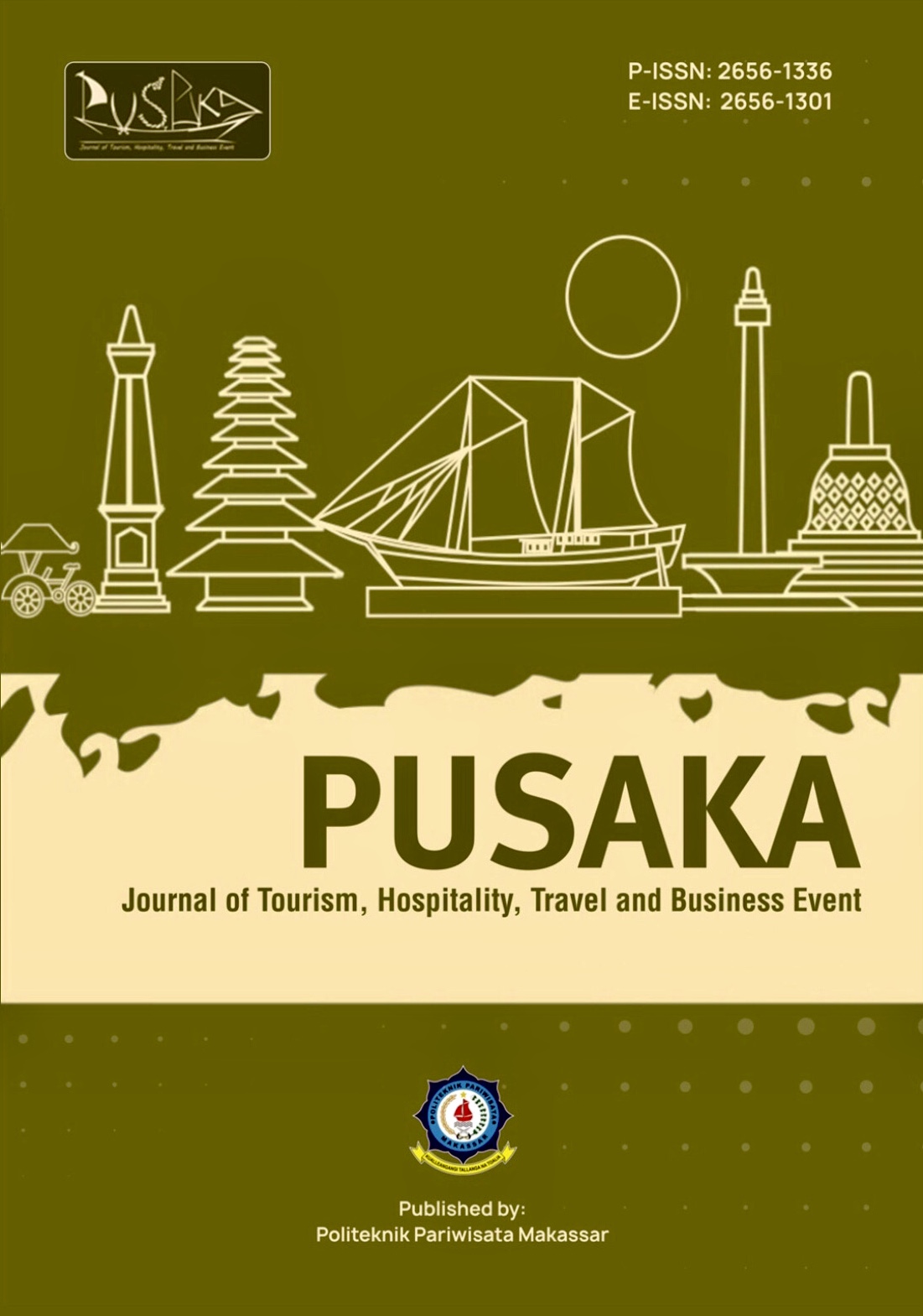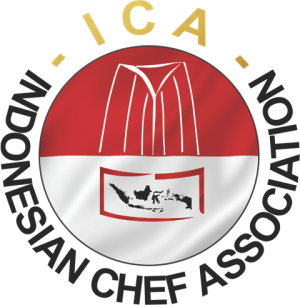Pengaruh Destination Social Responsibility dan Destination Reputation terhadap Revisit Intention dengan Perceived Trust sebagai Variabel Mediasi di Masa Pandemi Covid-19
DOI:
https://doi.org/10.33649/pusaka.v3i2.105Keywords:
Destination Social Responsibility, Reputation, Trust, Revisit, Wisata BelanjaAbstract
Pariwisata dan industri kreatif menjadi salah satu sektor yang paling terdampak dari pandemi Covid-19, termasuk diantaranya yaitu pusat perbelanjaan yang menjadi salah satu bagian dari wisata belanja. Pusat perbelanjaan atau kerap disebut Mall yang ada di Kota Surabaya tidak mengalami penutupan dikarenakan dianggap masih banyak orang yang menggantungkan hidupnya pada destinasi tersebut. Berbagai upaya perlu dilakukan oleh pengelola destinasi agar dapat meningkatkan kepercayaan dan mendorong tingkat kunjungan ulang guna mempertahankan profitabilitas sebuah destinasi. Penelitian ini bertujuan untuk mengetahui pentingnya peran dari destination social responsibility, destination reputation, dan perceived trust terhadap revisit intention pada masa pandemi covid-19. Penelitian ini merupakan penelitian kuantitatif dengan jenis penelitian riset konklusif. Pengunjung Tunjungan Plaza Surabaya selama masa pandemi menjadi fokus pada penelitian ini dengan menggunakan teknik non probability sampling dengan kriteria responden dengan rentang usia 15-54 tahun dan pernah mengunjungi Tunjungan Plaza setidaknya 2 kali selama pandemi covid-19 . Kuesioner online disebarkan kepada total 200 responden dan dilanjutkan dengan analisis data dengan analisis jalur menggunakkan program IBM SPSS Amos 24. Penelitian ini membuktikan bahwa destination social responsibility berpengaruh positif terhadap perceived trust dan juga revisit intention. Hasil lain menemukan bahwa destination reputation juga terbukti memiliki pengaruh positif terhadap perceived trust dan revisit intention. Selain itu perceived trust juga terbukti memiliki pengaruh positif terhadap revisit intention. Penelitian ini juga menemukan bahwa perceived trust terbukti berperan sebagai mediasi dalam hubungan destination social responsibility dan destination reputation terhadap revisit intention. Penelitian ini menunjukkan pentingnya membangun kepercayaan dan niat berkunjung ulang pada sebuah destinasi selama masa pandemi covid-19 masih berlangsung melalui penerapan destination social responsibility dan juga menciptakan destination reputation yang baik bagi masyarakat. Hasil penelitian ini dapat dijadikan dasar pertimbangan bagi pengelola destinasi wisata untuk dapat lebih memperhatikan tingkat kepercayaan serta mengatur strategi dalam mendorong niat berkunjung ulang terlebih pada kondisi krisis pandemi covid-19.
References
Abubakar, A. M., Ilkan, M., Meshall Al-Tal, R., & Eluwole, K. K. (2017). eWOM, revisit intention, destination trust and gender. Journal of Hospitality and Tourism Management, 31, 220–227. https://doi.org/10.1016/j.jhtm.2016.12.005
Ahn, J. (2019). Corporate social responsibility signaling, evaluation, identification, and revisit intention among cruise customers. 9582. https://doi.org/10.1080/09669582.2019.1650055
Ahn, J., & Kwon, J. (2020). CSR perception and revisit intention: the roles of trust and commitment. Journal of Hospitality and Tourism Insights, 3(5), 607–623. https://doi.org/10.1108/jhti-02-2020-0022
BBC News Indonesia. (2020). Keramaian wisata di tengah
PSBB, dilema “sudah jenuh di rumah” dan pengendalian Covid-19 - BBC News Indonesia. BBC News Indonesia. https://www.bbc.com/indonesia/indonesia-52953934
Bisnis.com. (2020). Pandemi Berdampak Cukup Besar Bagi Sektor Pariwisata.; bisnis.com. https://ekonomi.bisnis.com/read/20200807/12/1276123/pa ndemi-berdampak-cukup-besar-bagi-sektor-pariwisata
Blackwell, E. D., Miniard, P. W., & Engel, J. F. (2012). Consumer Behavior. Cengage Learning Asia.
Braun, E., Eshuis, J., Klijn, E. H., & Zenker, S. (2018). Improving place reputation: Do an open place brand process and an identity-image match pay off? Cities, 80(June 2017), 22–28. https://doi.org/10.1016/j.cities.2017.06.010
Butler, R. W. (1991). West Edmonton Mall As a Tourist Attraction. Canadian Geographer / Le Géographe Canadien, 35(3), 287–295. https://doi.org/10.1111/j.1541- 0064.1991.tb01103.x
Chitthanom, C. (2020). Relationships among medical activity perceived functional values, satisfaction trust, and revisit intention in medical tourism: A case study on clmv tourists in Thailand. ABAC Journal, 40(3), 54–77.
Christou, E. (2003). Guest Loyalty Likelihood in Relation to Hotels’ Corporate Image and Reputation: A Study of Three Countries in Europe. Journal of Hospitality and Leisure Marketing, 10(3–4), 25–56. https://doi.org/10.1300/ J150v10n03_05
Chung, N., & Kwon, S. J. (2009). Effect of trust level on mobile banking satisfaction: A multi-group analysis of information system success instruments. Behaviour and Information Technology, 28(6), 549–562. https://doi.org/10.1080/01449290802506562
Cnbcindonesia.com. (2020). Mengenal Lagi Corona, Virus Mematikan yang Berasal dari China. News: https://www.cnbcindonesia.com/news/20200127121914-4- 132981/mengenal-lagi-corona-virus-mematikan-yangberasal-dari-china
Darwish, A., & Burns, P. (2019). Tourist destination reputation: an empirical definition. Tourism Recreation Research, 44(2), 153–162. https://doi.org/10.1080/02508281.2018.1558754
Detiknews. (2020). Mal Tangguh di Surabaya Bersiap Diri Sambut New Normal New Spirit. detikcom. https://news.detik.com/berita-jawa-timur/d-5051790/maltangguh-di-surabaya-bersiap-diri-sambut-new-normalnew-spirit
Ghozali, I. (2016). Aplikasi Analisis Multivariate dengan Program IBM SPSS 23 (Kedelapan). Badan Penerbit Universitas Diponegoro.
Hasan, A. (2015). Tourism Marketing (T. CAPS, Ed.). Yogyakarta: CAPS (Center For Academic Publishing Service).
Hassan, S. B., & Soliman, M. (2020). COVID-19 and repeat visitation: Assessing the role of destination social responsibility, destination reputation, holidaymakers’ trust and fear arousal. Journal of Destination Marketing & Management, 105398. https://doi.org/10.1016/j.jdmm.2020.100495
IDN Times. (2020). 10 Tempat Wisata di Surabaya yang Ditutup akibat Corona; IDN Times. https://www.idntimes.com/travel/destination/prilaarofani/tempat-wisata-di-surabaya-yang-ditutup-akibatcorona. Suarasurabaya.net. (2020). Mall Tetap Buka dan Terapkan Standar Kebersihan Tinggi Selama Pandemi Covid-19. Suara Surabaya. https://www.suarasurabaya.net/ekonomibisnis/2020/maltetap-buka-dan-terapkan-standar-kebersihan-tinggi-selamapandemi-covid-19/
Jalilvand, M. R., Nasrolahi Vosta, L., Kazemi Mahyari, H., & Khazaei Pool, J. (2017). Social responsibility influence on customer trust in hotels: mediating effects of reputation and word-of-mouth. Tourism Review, 72(1), 1–14. https://doi.org/10.1108/TR-09-2016-0037
JawaPos.com. (2020). Terdampak Corona, Kunjungan ke Mal di Surabaya Turun 30 Persen. Jawapos.com. https://radarsurabaya.jawapos.com/read/2020/03/19/18452 8/terdampak-corona-kunjungan-ke-mal-di-surabaya-turun30-persen
Jung, H.-S., & Yoon, H. H. (2014). The Role of Corporate
Associations in Customers’ Trust, Loyalty, Revisit, and Switching Intention to a Foodservice Company: Focused on Corporate Ability and Corporate Social Responsibility Associations. Culinary Science & Hospitality Research, 20(1), 38– 54. https://doi.org/10.20878/cshr.2014.20.1.004004004
Katadata.co.id. (2020). Perkembangan Terkini Covid-19 di Indonesia: Total Kasus Capai 410.088 Kasus (Sabtu, 31/10). Katadata.co.id; Databoks. https://databoks.katadata.co.id/datapublish/2020/10/31/per kembangan-terkini-covid-19-di-indonesia-total-kasuscapai-410088-kasus-sabtu-3110#
Kim, M., Yin, X., & Lee, G. (2020). The effect of CSR on corporate image, customer citizenship behaviors, and customers’ long-term relationship orientation. International Journal of Hospitality Management, 88, 102520. https://doi.org/10.1016/j.ijhm.2020.102520
Kim, S.-B., & Kim, D.-Y. (2016). The impacts of corporate social responsibility, service quality, and transparency on relationship quality and customer loyalty in the hotel industry. Asian Journal of Sustainability and Social Responsibility, 1(1), 39–55. https://doi.org/10.1186/s41180-016-0004-1
Kotler, P., & Armstrong, G. (2014). Principles of Marketing (Fifteenth). Pearson Education Limited.
Kompas.id. (2020). Rangkaian Peristiwa Pertama Covid-19 –. Bebas.Kompas.Id. https://bebas.kompas.id/baca/riset/2020/04/18/rangkaianperistiwa-pertama-covid-19/
Leon Shiffman, L. L. K. (2010). Perilaku Konsumen (R. Maharani (ed.); 7th ed.). PT Indeks.
Liputan6.com. (2020). Alasan Masyarakat Kunjungi Mal yang Mulai Buka Hari Ini. Liputan6. https://www.liputan6.com/news/read/4279726/alasanmasyarakat-kunjungi-mal-yang-mulai-buka-hari-ini
Liputan6.com. (2020). Pengunjung Pusat Perbelanjaan Merosot hingga 90 Persen Imbas Corona Covid-19. Liputan6. https://www.liputan6.com/bisnis/read/4210580/pengunjun g-pusat-perbelanjaan-merosot-hingga-90-persen-imbascorona-covid-19
Malhotra, N. K. (2009). Riset Pemasaran: Pendekatan Terapan Edisi Keempat Jilid 1. PT Indeks.
Marinao Artigas, E., Vilches-Montero, S., & Chasco Yrigoyen, C. (2015). Antecedents of tourism destination reputation: The mediating role of familiarity. Journal of Retailing and Consumer Services, 26, 147–152. https://doi.org/10.1016/j.jretconser.2015.06.005
Ming Chuan, Z. (2015). The Reputation Crisis at the Tourism Destination: Connotation, Types and Management Strategies. 3(6), 35–40.
Nadarajah, G. (2018). RESEARCH ARTICLE EFFECTS OF SERVICE QUALITY, PERCEIVED VALUE AND TRUST ON DESTINATION LOYALTY Profile of Respondents. International Journal of Recent Advances in Multidisciplinary Research, 05(01), 3357–3362.
Nielsen.com. (2020). menggaet pengunjung mall dengan inovasi. https://www.nielsen.com/id/id/pressreleases/2020/menggaet-pengunjung-mall-dengan-inovasi/ Palacios-Florencio, B., García del Junco, J., CastellanosVerdugo, M., & Rosa-Díaz, I. M. (2018). Trust as mediator of corporate social responsibility, image and loyalty in the hotel sector. Journal of Sustainable Tourism, 26(7), 1273–1289. https://doi.org/10.1080/09669582.2018.1447944
Park, J. H., & Chung, L. C. (2016). The impact of reputation of culture & tourism oriented markets on revisit and WOM intention in traditional markets. Journal of Distribution Science, 14(8), 77–86. https://doi.org/10.15722/jds.14.8.201608.77
Sarwono, J. (2011). Get to know the path of Analysis: History, Understanding, and Application, Scientific Journal of Business Management. Jurnal Ilmiah Manajemen Bisnis, 11(2), 285–296.
Sato, S., Gipson, C., Todd, S., & Harada, M. (2017). The relationship between sport tourists ’ perceived value and destination loyalty : an experience-use history segmentation approach. Journal of Sport & Tourism, 0(0), 1–14. https://doi.org/10.1080/14775085.2017.1348967
Setiawan, I. A., & Ritonga, F. (2011). Analisis Jalur (Path Analysis) dengan Menggunakan Program AMOS. Graha Ilmu.
Shirvani Dastgerdi, A., & De Luca, G. (2019). Strengthening the city’s reputation in the age of cities: an insight in the city branding theory. City, Territory and Architecture, 6(1). https://doi.org/10.1186/s40410-019-0101-4
Soliman, M. (2019). Extending the Theory of Planned Behavior to Predict Tourism Destination Revisit Intention. International Journal of Hospitality and Tourism Administration, 00(00), 1–26. https://doi.org/10.1080/15256480.2019.1692755
Surabaya.go.id. (2020). Pemerintah Kota Surabaya. Surabaya.Go.Id. https://www.surabaya.go.id/id/berita/57269/dukungpemkot-surabaya-putus-ma
Su, L., & Huang, Y. (2018). How does perceived destination social responsibility impact revisit intentions: The mediating roles of destination preference and relationship quality. Sustainability (Switzerland), 11(1). https://doi.org/10.3390/su11010133
Su, L. J., Hsu, M. K., & Marshall, K. P. (2014). Understanding the Relationship of Service Fairness, Emotions, Trust, and Tourist Behavioral Intentions at a City Destination in China. Journal of Travel and Tourism Marketing, 31(8), 1018–1038. https://doi.org/10.1080/10548408.2014.892466
Su, L. J., Hsu, M. K., & Swanson, S. (2017). The Effect of Tourist Relationship Perception on Destination Loyalty at a World Heritage Site in China: The Mediating Role of Overall Destination Satisfaction and Trust. In Journal of Hospitality and Tourism Research (Vol. 41, Issue 2). https://doi.org/10.1177/1096348014525630
Su, L., Lian, Q., & Huang, Y. (2020). How do tourists’ attribution of destination social responsibility motives impact trust and intention to visit? The moderating role of destination reputation. Tourism Management, 77(June 2019), 103970. https://doi.org/10.1016/j.tourman.2019.103970
Su, L., & Swanson, S. R. (2017). The effect of destination social responsibility on tourist environmentally responsible behavior: Compared analysis of first-time and repeat tourists. Tourism Management, 60, 308–321. https://doi.org/10.1016/j.tourman.2016.12.011
Su, L., Swanson, S. R., & Hsu, M. (2018). Tourists’ Social Responsibility Perceptions of an Urban Destination in China: The Mediating Role of Consumption Emotions. Journal of China Tourism Research, 14(3), 310–333. https://doi.org/10.1080/19388160.2018.1490679
Su, L., Wang, L., Law, R., Chen, X., & Fong, D. (2017). Influences of destination social responsibility on the relationship quality with residents and destination economic performance. Journal of Travel and Tourism Marketing, 34(4), 488–502. https://doi.org/10.1080/10548408.2016.1193101
Tempo. (2020). Mal Dibuka, Mendag: Kalau Tidak Dimulai, Semua Tidak Bergerak. TEMPO.CO. https://bisnis.tempo.co/read/1357886/mal-dibuka-mendagkalau-tidak-dimulai-semua-tidak-bergerak
Tosun, C., Dedeoğlu, B. B., & Fyall, A. (2015). Destination service quality, affective image and revisit intention: The moderating role of past experience. Journal of Destination Marketing and Management, 4(4), 222–234. https://doi.org/10.1016/j.jdmm.2015.08.002
Tripadvisor. (2021) 10 Objek Wisata Terbaik di Jawa Timur.
Tripadvisor. https://www.tripadvisor.co.id/Attractionsg2301797-Activities-a_allAttractions.trueEast_Java_Java.html
Widjaja, Y. I., Khalifa, G. S. A., & Abuelhassan, A. E. (2019). the Effect of Destination Reputation on the Revisit Intention To Halal Tourism Destination of Jakarta. International Journal of Business, Economics and Law, 20(5), 104–111.
Wu, H. C., Cheng, C. C., & Ai, C. H. (2018). A study of experiential quality, experiential value, trust, corporate reputation, experiential satisfaction and behavioral intentions for cruise tourists: The case of Hong Kong. Tourism Management, 66, 200–220. https://doi.org/10.1016/j.tourman.2017.12.011
Yamashita, R., & Takata, K. (2020). Relationship between prior knowledge, destination reputation, and loyalty among sport tourists. Journal of Sport and Tourism, 24(2), 143–153. https://doi.org/10.1080/14775085.2020.1763192
Zeithaml, Valarie A., Mary Jo Bitner dan Dwayne D. Gremler. (2009). Services Marketing – Integrating Customer Focus Across The Firm (5 th ed). New York: McGrawHill
Zhang, H., Wu, Y., & Buhalis, D. (2018). A model of perceived image, perceived trusts and revisit intention. Journal of Destination Marketing and Management, 8(June), 326– 336. https://doi.org/10.1016/j.jdmm.2017.06.004
Downloads
Published
How to Cite
Issue
Section
License

This work is licensed under a Creative Commons Attribution-ShareAlike 4.0 International License.






















